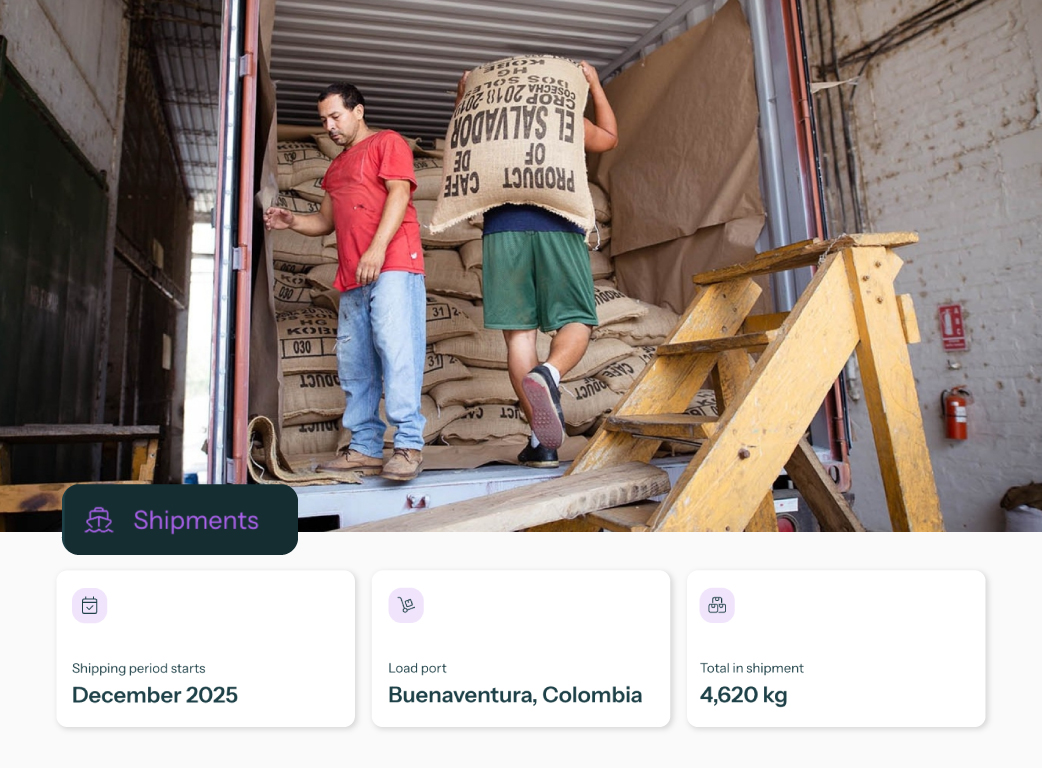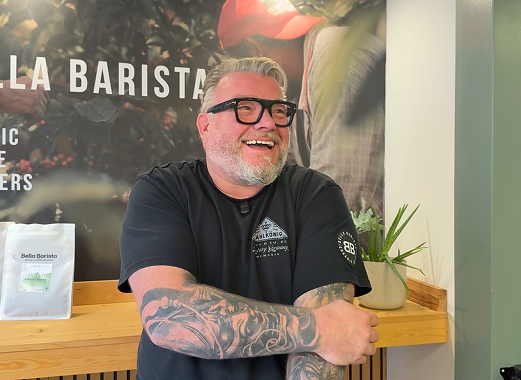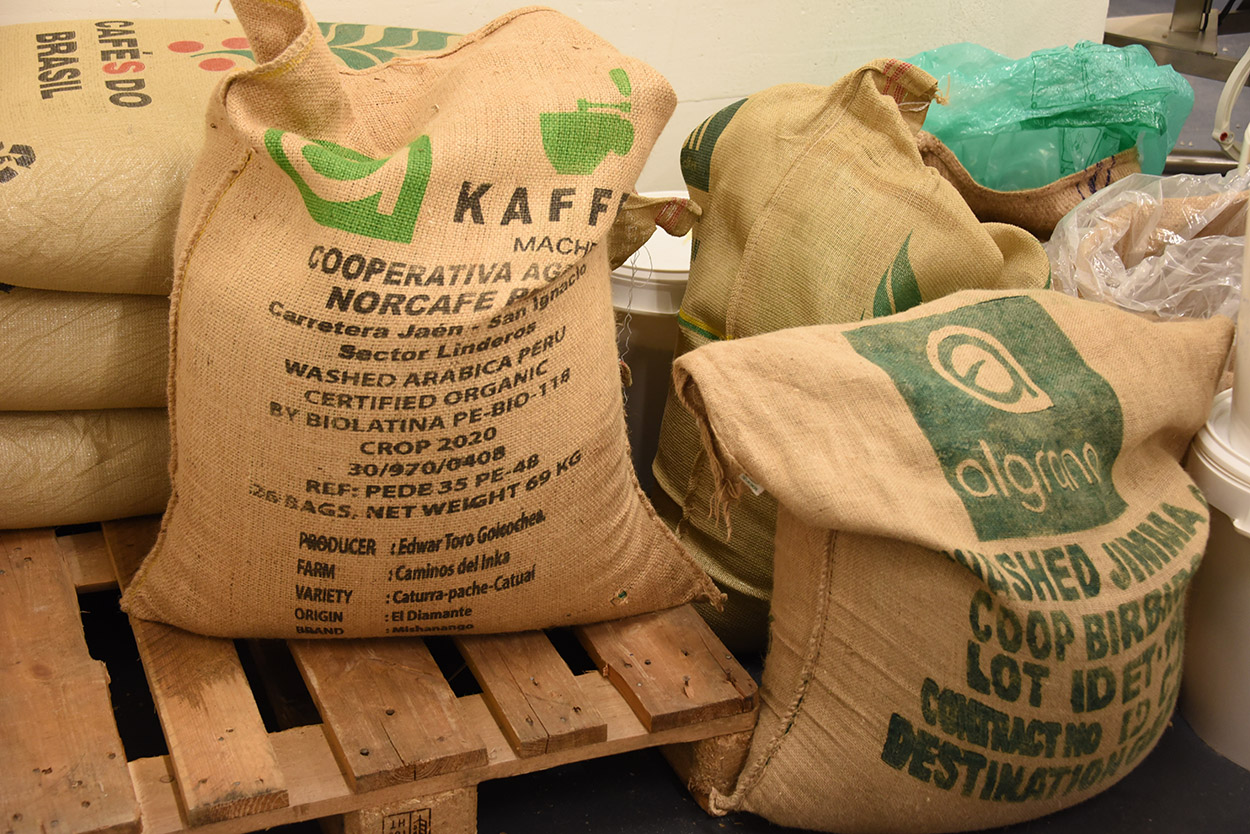The US coffee tariff is gone, but the specific 40% duty on Brazilian coffee hasn't dropped. Here is the breakdown of the conflicting orders and what you need to know before approving your next shipment.
.png)
.png)
The US coffee tariff is gone, but the specific 40% duty on Brazilian coffee hasn't dropped. Here is the breakdown of the conflicting orders and what you need to know before approving your next shipment.

Track your upcoming shipments easily in your Algrano account. See your contracts onboard the container, the shipping dates, the load port, and find the contacts of the responsible exporter.
.png)
Join us in Zurich or Raleigh to celebrate two of our partners: Sancoffee and Clearpath. Get an exclusive look at their amazing auction lots before they are gone!
Track your upcoming shipments easily in your Algrano account. See your contracts onboard the container, the shipping dates, the load port, and find the contacts of the responsible exporter.


Nico Herr of Mountain Harvest shares her experience in sales to roasters, alongside one of her partners, Luci Ramirez from Humboldt Bay Coffee. They walk you through what it takes to pitch coffees to roasters, and how to start strong relationships.
%201%402x%20(4).png)
Learn how Verified Sellers can set up offers correctly and make it easier for roasters to buy.
%201%402x%20(2).png)
The coffee import landscape has shifted. We break down the new US tariffs and offer actionable strategies for roasters and producers to manage their sourcing, sales, and partnerships.
Join us in Zurich or Raleigh to celebrate two of our partners: Sancoffee and Clearpath. Get an exclusive look at their amazing auction lots before they are gone!
.png)
.png)
Higher quality from Brazil's 2025 harvest is being held back by producers waiting for better prices, creating a challenge for roasters. Keep reading to learn the essential strategies you'll need to navigate the market and secure your supply of coffee.
.png)
Sam LaRobardiere, owner of Theory Coffee Roasters, talks about how he was caught in a reactive cycle of stress and compromise buying spot, but he found a way forward.

Discover how Marcel Binley of Bella Barista turned crippling cash flow and scary logistics into peace of mind, business certainty, and 30-40% anticipated growth through a partnership with Algrano.
Get insights from industry leaders, sourcing guides, and harvest updates sent straight into your inbox.

Your 18-month guide to shipments and arrivals, helping you plan ahead and enjoy the unique benefits of working directly with producers.

Producers are getting more business and premiums, while new roasters are sourcing more coffee than ever with confidence. Learn about Algrano’s impact, pre-financing, data sharing with producers, and what's beyond relationship coffee.
%201.png)

Discover the behind-the-scenes of coffee export and import, learn the lingo of contracts, nail quality protocols, and hear directly from producers about direct trade — all in our two-day workshop in Zurich.
%201%402x%20(2).png)
The coffee import landscape has shifted. We break down the new US tariffs and offer actionable strategies for roasters and producers to manage their sourcing, sales, and partnerships.
%201%402x%20(3).png)
Celebrating a decade of Algrano's journey at World of Coffee Geneva 2025. Here you can check the highlights the launch of new services to empower producers, the genuine connections forged at the booth, and the community spirit that continues to drive Algrano's mission of people-first coffee trade.

Learn how to clearly present your coffee's price to any roaster, discover your coffee's true market value, and become more competitive.

What you need to know before sending private offers to your roasters.
%201.png)
The US has introduced new tariffs on green coffee, starting April 5th, 2025. We understand you may have questions. Below is a summary of the new tariffs and what they mean for roasters in the USA and your supply chain partners at origin.
%201%402x%20(1).png)
Help producers become better sellers by joining our Roaster Panel. Express your interest here!

Join Algrano at Booth #1369 at World of Coffee Geneva, June 26th to 28th. Celebrate our 10th anniversary, meet producers & roasters, experience unique cuppings, explore DACH market insights with CEO Raphael Studer, and network with roasters and coffee professionals cycling through Geneva. Your hub for direct sourcing – connect with the Algrano team!
%201.png)
How do coffee producers really sell their beans and what stands in the way of fair prices? From learning to price and market their own lots to surviving climate shocks and challenging the rules of global trade, Brazilian producers show what it really takes to “go direct.” Featuring insights from the Filter Stories podcast, this post unpacks the real business behind beautiful coffee, and why relationships, not just quality, drive sustainability.
%201%402x.png)
From a buzzing booth to bold conversations on finance and accountability, producers and roasters came together not just to taste coffee, but to rewrite the rules of how it’s sourced. This post brings you the standout stories: a roaster’s call for real commitment, a producer’s fight for fair credit, and the quiet power of transparent conversations that actually change things.
%201%402x.png)
Whether you're sourcing green coffee, showcasing your harvest, or just soaking in the energy, SCA Expo 2025 is the place to be.
This guide breaks down everything you need to plan your schedule, taste the right coffees, hit impactful lectures, and build meaningful relationships across the supply chain—especially if you're a roaster or producer. Don’t just attend: make it count.
%201%20(2).png)
When we landed for PRF Honduras 2025 (Producer Roaster Forum), we expected to talk about climate change and the C market. We got way more than that. Between warehouse visits, bank-controlled coffee, and CEO-level farmers, one thing became clear: origin is where the action is. Here’s a recap of what we saw, heard, and learned—or at least what can be shared in public…